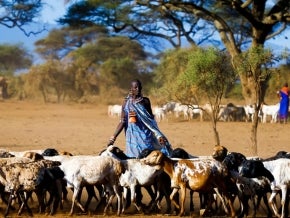Image

Innovative investments in nature: native honey from the Chaco forest of Argentina
In the Argentine Chaco forest, the indigenous and creole peoples of Pampa del Indio work together to produce honey from the "melipona bees," which are native stingless bees (Tetragonisca fiebrigi and Scaptotrigona jujuyensis). In a recent blog, we explain how this zone has become a sanctuary for…
Image

Fixing the food system: how cities can truly feed the world
Urban areas can change the broken food system that causes ill-health and environmental degradation
Over half of the world’s 7.7 billion people live in towns and cities. By 2050, more than two thirds of them will do so. Materials, waste, emissions, knowledge and influence follow this population…
Image

Zero Hunger world is within reach, but we must work together to achieve it
Today, on World Food Day, the global community is mobilizing to reach a Zero Hunger world. With a changing climate, inequality, and rapid population growth the challenges we face on the way seem insurmountable. However, with governments, private sector and individuals working together, we can…
Image

Unlocking economic growth through integrated natural resource planning and governance
Burkina Faso, a landlocked country in the West African Sahel, includes sparse and dry forests, woodlands, wooded and shrub savannas, and a large desert area to the North. The country relies heavily on agriculture, yet faces shrinking arable land and increasing soil degradation. Enhancing factors…
Image

How can we feed the world and keep the planet healthy? We start by making smallholder farming more sustainable
People are already consuming at a rate faster than the planet can replenish. Yet the world’s population is expected to grow from 7 billion to 9 billion by 2050. This will considerably increase demand for energy, transport, buildings and food.
Agricultural production will need to increase to meet…
Image

Our food system is broken: we must repair it
Let’s start with the good news. Humankind is living longer than ever before. Fewer of us are going to bed hungry. Improvements in diets and modern medicine have contributed to a 20-year increase in the average global life expectancy since 1960. The number of undernourished people has fallen from 1…